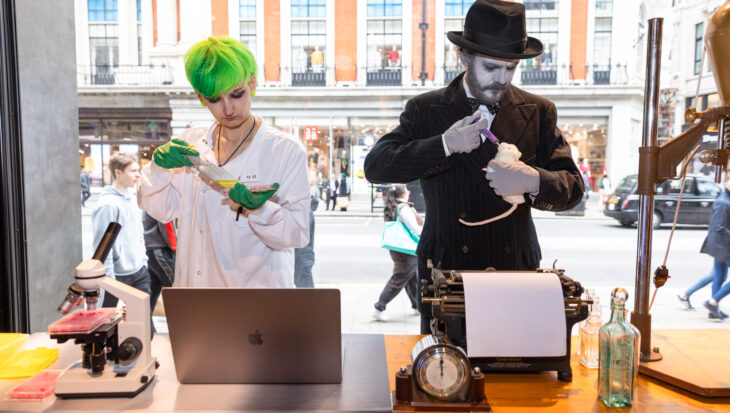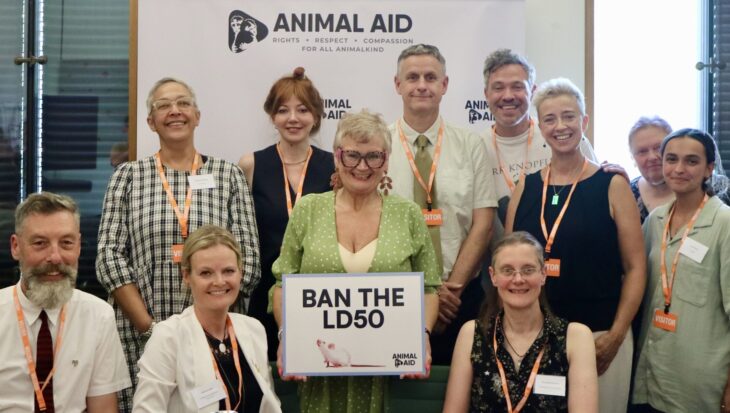When asked: Would you knowingly donate to a medical research or health charity that funds experiments on animals, or not? an overwhelming 82 per cent of total respondents answered ‘No’. Just 16 per cent answered ‘Yes’, with 2 per cent falling into the ‘Don’t know’ category.
Commissioned by Animal Aid, the GfK NOP poll fieldwork was carried out between August 19 and 21. A total of 1000 respondents – weighted for sex, age, social class and geographical region – were questioned.
The results are bound to seriously unsettle prominent charities, such as the British Heart Foundation, Cancer Research UK, Parkinson’s UK and the Alzheimer’s Society. The four bodies are the focus of the Victims of Charitycampaign launched by Animal Aid in June. The campaign exposes the appallingly cruel animal research that they fund and calls for the public to withhold from them all financial support until they switch to humane, non-animal methods of research (1).
Unlike a recent government-commissioned poll (2) that sought respondents’ support for animal research ‘for which there is no alternative…as long as there is no unnecessary suffering…and only for life-threatening diseases’, respondents to the new Animal Aid-commissioned NOP poll were asked a straightforward ‘unloaded’ question.
Two key messages to emerge from the stunning poll results are that:
- Given the huge financial support medical research charities that fund animal research currently receive, it is clear that the public has been kept in the dark about these charities’ funding of animal experiments.
- While a significant number of people declare support for animal research where they see it as an activity distant from themselves, when asked if they personally wish to fund such research, an overwhelming majority answer emphatically ‘No’.
Animal Aid’s scientific report, Victims of Charity, describes experiments in which charity-funded researchers deliberately damaged monkeys’ brains with toxic chemicals, slowly and systematically destroyed the hearts of dogs, and injected mice with cancerous tissue. The report’s authors conclude that laboratory experiments on animals produce information that cannot be reliably applied to human medicine – and can even be dangerously misleading.
The NOP poll news comes as Animal Aid posts 30 anti-vivisection billboards in central London, featuring a photograph of heart disease sufferer Joan Court (3) and her statement: ‘I won’t support the British Heart Foundation until it stops funding animal experiments.’
Located in prominent West End and Central London sites (4), including some within half a mile of the British Heart Foundation headquarters in Hampstead Road, the billboards will stay up for four weeks. The six-by-four-foot telephone kiosk messages will be followed by national newspaper advertisements in September, with more billboards planned.
Says Animal Aid’s Director, Andrew Tyler:
‘It is clear from these dramatic poll results that most people have no idea that some of their money is being used to pay for appallingly cruel animal experiments – and it seems that the charities are happy with that situation. When the public are asked loaded questions by the animal research establishment, they will give qualified support for what they are told is humane and productive animal experimentation. But when you ask them straight-forwardly if they want their money used for animal research, the answer is a clear cut ‘No’. The charities concerned had best heed this message, and quickly.’
More information
Notes to Editors
- Animal Aid is urging people to give to charities such as the Caring Cancer Trust, the Children’s Research Fund, and the Dr Hadwen Trust, which support only modern, humane and effective techniques including MRI scans, human tissue cultures and computer modelling. Medical research charities, in response to Animal Aid’s Victims of Charity campaign, have implied that they are forced to conduct animal experiments because medicines must first be tested in animals before being administered to human patients. But the charities are funding disease research, not drug testing (which is a regulatory process driven by commercial interests). There is no requirement to use animals in disease research.
- Views on Animal Experimentation is an Ipsos MORI poll conducted on behalf of the Department for Business, Innovation and Skills (BIS) in December 2009. Even when respondents were softened up with pro-experimentation comments, support for animal use peaked at 71% and was as low as 50%.
- A document containing Joan Court’s statement, and those of 19 other contributors, is available on request. Joan’s full statement reads: My name is Joan Court. I am 92 years old and I have ventricular heart failure and arthritis. Under no circumstances would I agree to animal experiments being carried out on my behalf, and I do not believe that any animal experiments would have any relevance to my condition, or to my recovery from a slight stroke.

